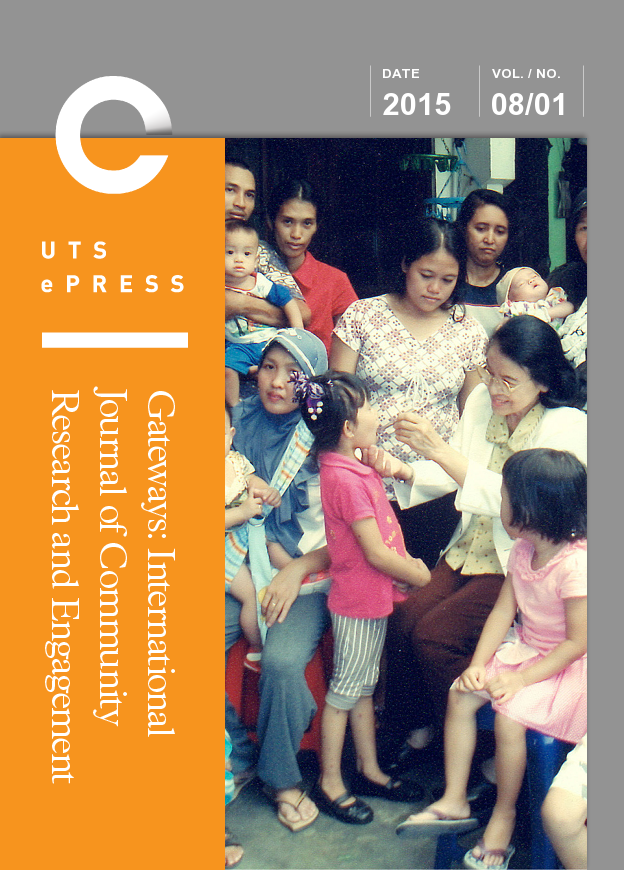Improving health and education outcomes for children in remote communities: A cross-sector and developmental evaluation approach
Main Article Content
Abstract
Early childhood is one of the most influential developmental life stages. Attainments at this stage will have implications for the quality of life children experience as they transition to adulthood. Children residing in remote Australia are exposed to socioeconomic disadvantage that can contribute to developmental delays and resultant poorer education and health outcomes. Complex contributing factors in far west New South Wales have resulted in children with speech and fine motor skill delays experiencing no to limited access to allied health services for a number of decades. More recently, growing awareness that no single policy, government agency, or program could effectively respond to these complexities or ensure appropriate allied health service access for children in these communities has led to the development of the Allied Health in Outback Schools Program, which has been operational since 2009. The program is underpinned by cross-sector partnerships and a shared aspirational aim to improve the developmental outcomes of children to enhance their later life opportunities. It was identified early that the initiative had the potential to deliver mutually beneficial outcomes for communities and participating partner organisations.
Over the last five years the program has been the catalyst for partnership consolidation, expansion and diversification. The developmental evaluation approach to continuous program adaptation and refinement has provided valuable insights that have informed health and education policy and enabled the program to be responsive to changing community needs, emerging policy and funding reforms.
This article explores the evolution of the program partnerships, their contribution to program success and longevity, and their capacity to respond to an emergent and dynamic environment. The authors propose that a community-centred and developmental approach to program innovation and implementation in remote locations is required. This is based on the premise that contemporary linear, logic-based policy development and funding allocations, with predetermined program deliverables and outcomes, are no longer capable of responding appropriately to the complexities experienced by remote communities.
Keywords: allied health, remote communities, cross-sectoral partnerships, service learning
Article Details

This work is licensed under a Creative Commons Attribution 4.0 International License.
Authors who submit articles to this journal from 31st March 2014 for publication, agree to the following terms:
a) Authors retain copyright and grant the journal right of first publication with the work simultaneously licensed under a Creative Commons Attribution License that allows others to share and adapt the work with an acknowledgement of the work's authorship and initial publication in this journal.
b) Authors are able to enter into separate, additional contractual arrangements for the non-exclusive distribution of the journal's published version of the work (e.g., post it to an institutional repository or publish it in a book), with an acknowledgement of its initial publication in this journal.
c) Authors are permitted and encouraged to post their work online (e.g., in institutional repositories or on their website) prior to and during the submission process, as it can lead to productive exchanges, as well as earlier and greater citation of published work (See The Open Access Citation Advantage Service). Where authors include such a work in an institutional repository or on their website (ie. a copy of a work which has been published in a UTS ePRESS journal, or a pre-print or post-print version of that work), we request that they include a statement that acknowledges the UTS ePRESS publication including the name of the journal, the volume number and a web-link to the journal item.
d) Authors should be aware that the Creative Commons Attribution (CC-BY) License permits readers to share (copy and redistribute the work in any medium or format) and adapt (remix, transform, and build upon the work) for any purpose, even commercially, provided they also give appropriate credit to the work, provide a link to the license, and indicate if changes were made. They may do these things in any reasonable manner, but not in any way that suggests you or your publisher endorses their use.
For Volume 6 (2013) and before, the following copyright applied:
Articles published by UTSePress are protected by copyright which is retained by the authors who assert their moral rights. Authors control translation and reproduction rights to their works published by UTSePress. UTSePress publications are copyright and all rights are reserved worldwide. Downloads of specific portions of them are permitted for personal use only, not for commercial use or resale. Permissions to reprint or use any materials should be directed to UTSePress.
